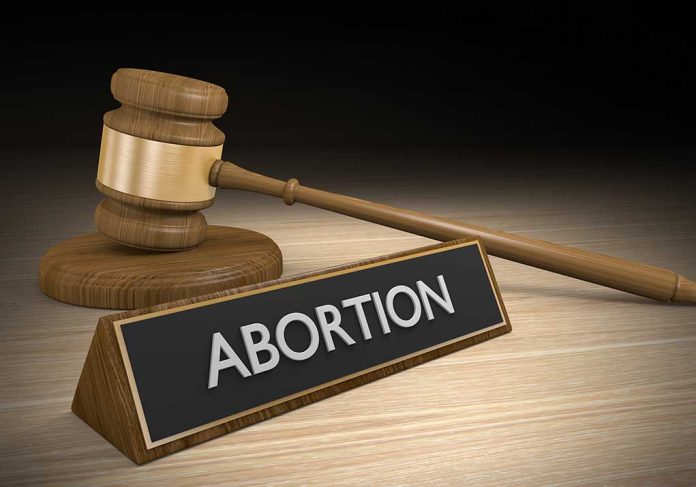
Trump administration lawyers have filed a motion to dismiss a lawsuit challenging telehealth access for the abortion medication mifepristone, continuing a legal defense previously established under Biden.
Key Takeaways
- The Trump administration has requested dismissal of a lawsuit brought by Missouri, Idaho, and Kansas seeking to restrict telehealth access to the abortion pill mifepristone.
- Justice Department attorneys argue the states lack legal standing, missed the statute of limitations, and filed in an improper venue without connection to the Texas district.
- Medication abortions now account for more than half of all U.S. abortions, with 28 states currently restricting access to mifepristone.
- The case represents a continuation of federal legal arguments first articulated during the Biden administration, despite expectations of policy shifts under Trump.
Trump Administration’s Legal Position on Mifepristone
In a surprising development for conservatives anxiously awaiting policy shifts on abortion access, Trump administration attorneys have asked a federal judge to dismiss a lawsuit seeking to restrict telehealth access to the abortion medication mifepristone. The lawsuit, brought by Republican attorneys general in Missouri, Idaho, and Kansas, challenges FDA decisions since 2016 that expanded access to the drug, including allowing prescriptions via telemedicine and distribution by mail.
In court filings, administration lawyers maintained legal arguments previously established under Biden, stating: “At bottom, the states cannot keep alive a lawsuit in which the original plaintiffs were held to lack standing, those plaintiffs have now voluntarily dismissed their claims, and the states’ own claims have no connection to this district.” This procedural challenge represents the Trump administration’s first official position on the contentious mifepristone issue since taking office.
Legal Arguments for Dismissal
The Justice Department’s motion for dismissal rests on several technical but powerful legal grounds. Administration lawyers assert that the states lack proper venue, as their claims have no legitimate connection to the Northern District of Texas where the case was filed. Additionally, they argue the states missed the six-year statute of limitations to challenge FDA actions from 2016 and lack legal standing to bring the suit in the first place.
“Regardless of the merits of the states’ claims, the states cannot proceed in this court,” administration lawyers wrote in their filing.
The lawsuit’s history is complex, having been taken up by the three states after the original plaintiffs dropped their case following a Supreme Court ruling that they lacked legal standing. U.S. District Judge Matthew Kacsmaryk, a Trump appointee known for conservative rulings on reproductive issues, permitted the states to continue the litigation despite these setbacks.
States’ Arguments and Counter-Claims
Missouri, Kansas, and Idaho contend they have standing to pursue the case based on potential Medicaid costs for treating complications from mifepristone use. They further argue for keeping the case in Texas to preserve efficiency after two years of litigation. These Republican-led states claim the FDA improperly eased restrictions on the medication, which was first approved in 2000 but has seen expanded access under subsequent regulatory changes.
The states’ persistence comes as medication abortions now constitute more than half of all abortions performed in America, according to recent data. This shift toward pharmaceutical rather than surgical abortion has become a central battleground in post-Roe America, with 28 states currently imposing restrictions on mifepristone access. For many conservative voters, the administration’s stance on this case will be closely watched for signals about Trump’s approach to abortion restrictions.
Broader Context of Trump’s Abortion Policies
This legal move comes alongside other actions that have surprised some conservative observers. The administration recently dropped a high-profile case concerning emergency abortion access in Idaho, a decision that raised questions about the administration’s abortion policy direction. The Idaho emergency abortion case centered on whether federal emergency room requirements trump state abortion bans when a patient’s health is at serious risk.
“Their move to drop this case against Idaho I think really shows what their true priorities are — and it is to push an anti-abortion political agenda rather than support the lives, health and well being of pregnant women and people, not just in Idaho but across the country because this case does have far-reaching impact,” said Brittany Fonteno, president of the National Abortion Federation.
While the administration’s position on the mifepristone telehealth case reflects continuity with previous legal arguments, many conservative supporters await more definitive policy shifts on abortion access that align with campaign promises. The seemingly contradictory approaches – dropping one abortion-related case while defending against restrictions in another – highlight the complex legal and political landscape the administration must navigate when addressing reproductive health issues.









